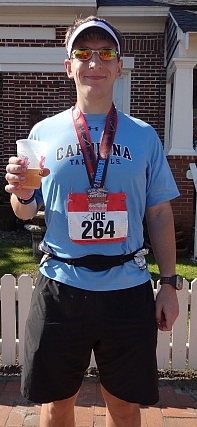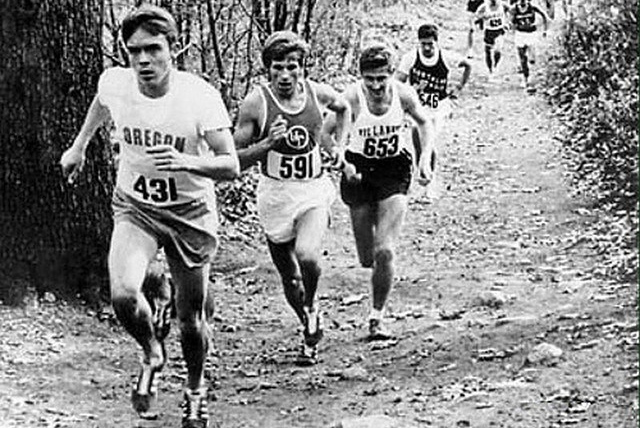In the fall of 2001 after the season’s first home cross country race, I went on a four mile warm-down with a few other runners from the Varsity team.
After the run as we were recounting our battle stories from the race, one of the track coaches walked by and asked why we were at school so late. We said we had a race and then ran 4 miles as a warm-down – which at the time, was longer than the usual two miles we typically ran.
Junk miles! our track coach scoffed.
I bit my tongue. See, I don’t believe in junk miles (for the most part – but that is an entirely different topic!). And what my track coach didn’t know was that I had recently run more “junk” miles than ever before – and had just won that cross country race (my first ever) in a significant personal best.
Mileage works!
But even with this very different philosophy, my track coach wasn’t a bad coach. Far from it: under his coaching, I ran personal bests in every track event that winter and spring from the 800m to 2-mile.
So, who’s right?
Neither of us! Both of our approaches worked. In running, there are many philosophies and they can all be used effectively.
This is why I say, “it depends…” when I get running questions like:
Do I have to run a 20 mile long run before a marathon?
Should I follow a high mileage or low mileage schedule?
What’s better, quality or quantity?
So, philosophy doesn’t necessarily make a good coach. Opposite approaches can both give fantastic results.
But, good coaches usually have similar backgrounds. There are many traits to a successful running coach – and certain warning signals that should make you pause and think twice about hiring someone to help you reach your running goals.
So let’s look at what I think are the good components to a good running coach. And of course, I’m a bit biased here because I have all these traits 🙂
But you’ll see that some traits are a spectrum: they’re not absolute and a coach can be somewhere in the middle (like me).
Personal Running Experience

Is your running coach a runner? I hope so! Shouldn’t that be a requirement?
And as we all know, there are all types of runners – from elites to back of the packers. Does a coach need to be a former professional runner? I don’t think so.
This is one of those traits that falls along a spectrum. Most runners want a coach who has had some level of personal running success – whether that’s a personal best, distance covered, or years of experience. Let’s dive into all three.
Personal bests: Most coaches are fast (or formerly fast if they’re older). This helps them understand training on a deeper level – the day-to-day fatigue, goal-setting process, what it feels like to succeed and fail, and empathize with their athletes.
Personally, I want a coach who is faster than me so they know how to push me to a new level. As a 2:39 marathoner, I’m faster than most people. But in the grand scheme of things, I’m not that fast. There are plenty of other speedy people out there who can run laps around me!
Distance: This is more important for ultramarathon coaches. If you’ve never run 100 miles, it will be more difficult to coach a runner on the nuances and subtleties of covering such a distance. While I don’t think it’s mandatory, it’s certainly helpful.
Years of experience: Runners should see how long their coaches have been running – or in other words, personally immersed in the sport. I find it helpful to focus on years of training, not just years of running as a recreational runner.
There are plenty of fantastic coaches out there who weren’t very fast runners or have never run marathons – but still have seen a tremendous amount of coaching success. So while these can be helpful, they’re not the most important.
I consider that to be…
Coaching Experience
This comes in two forms: years of coaching other runners and also experience being coached.
The first is self-explanatory and most runners understand a coach who has 6 months of coaching experience might not have learned as much as a coach with 30 years of experience.
But what about a coach’s experience being coached? If a coach hasn’t trained under any coaches in their life, they may not understand some of the most effective coaching techniques – like the right way to lie to your athletes, the benefits of not over-coaching, and examples of effective and destructive motivation.
I’ve had over ten coaches in my 16 years of running – in high school, college, and beyond. I’ve seen it all: coaches who deeply cared about my progress – and those who weren’t too interested. More importantly, I’ve been exposed to many different coaching styles from super aggressive to more nurturing.
Seeing those coaching styles in action, learning from them, and now applying them in my own coaching career is what helps me provide coaching that gets runners such incredible results. Without this experience, I don’t think I’d be able to provide advice that’s as actionable or motivating.
Education for Running Coaches
The two standard coaching certifications are those from USA Track & Field (this is what I have) and the Road Runners Club of America. Both are great, though I chose USATF because it’s the national governing body for track & field and road racing in the US.
Do you absolutely need a coaching certification? I don’t think so – though if you don’t, you’d better have a lot of personal running experience, an obsession with good running books, and be able to deliver results for your runners.
Coaches for ultramarathoners don’t necessarily need a certification because ultra-distance isn’t even covered in the curriculum, though an understanding of the fundamentals is incredibly valuable. And for any running coach, it’s this foundation that’s most critical. It helps us understand the basics:
- Training Theory (periodization, phases of training, adaptation, variety, individualization, etc.)
- Physiology (how training and lifestyle affect the body)
- Biomechanics / Biomotor Abilities (I nicknamed these the “components of fitness“)
It’s this background that helps me evaluate any training program. If it violates basic training theory – like CrossFit Endurance – it’s not sound training. It’s just random exercise.
Some coaches also have graduate degrees in exercise science, kinesiology, or applied physiology. Coaching is both an art and a science and these degrees can help. Though many world-class coaches don’t have them and I don’t think they’re necessary.
If you’re hiring a running coach, I’d look for a certification from either USATF or RRCA for best results.
Coaching Ethics
Is your coach ethical? That’s a complex word, but in the sport of running it usually means he:
- Won’t encourage you to use banned performance-enhancing drugs (PEDs)
- Puts your overall health over short-term gains
- Follows the rules at all races
- Doesn’t steal paid programs or plagiarize work from other coaches
The other day Steve Magness tweeted that an Olympic Gold medalist had tested positive for banned PEDs – but the more interesting part is that this is her coach’s 16th banned athlete. That trend is alarming!
The issue of performance-enhancing drugs is largely irrelevant to most runners since we have virtually no incentive to use them. For us, we care about the integrity of our coach and that he has our best interests at heart.
Take for example, the recent plagiarism of running articles from myself and coach Jeff Gaudette of RunnersConnect by Matt Johnson of Runner Academy. You can read more details here (Matt denied the allegations but offered to refund his customers. Then he took down the post. Interesting, no?).
Here’s a “coach” who stole articles that take 4-6 hours to create (and sometimes more) and tried to pass them off on his own. Is a person who can’t write a coherent training article someone you want coaching you?
What’s more damning is the theft of RunnerConnect’s flagship program (one that I use myself) by Matt Johnson – Strength Training for Runners. Here, he copies the same word-for-word routines, progressions, and prescriptions of the program.
I had an unfortunate conversation with yet another coach recently who said that it’s “hard to steal exercises” because “they’re in every magazine.”
Sigh.
Here’s the problem: the exercises are NOT what’s important. As coach Jay Johnson once said perfectly on Twitter:
Can’t stand it when people want to know what 5 exercises to do to get stronger. They should think in terms of routines and progressions.
If your coach can’t create a strength program, they don’t understand the value of a routine and how it progresses. This is the real value of the strength work in Jeff’s program and in what’s included in Injury Prevention for Runners.
In a follow-up conversation with another runner, he summed up my thoughts exactly:
I thought it funny and sad that she thought only of lunges as a “workout.” Coaching is more than a certification course.
So when you’re choosing a coach, look into their background. Have they stolen other coach’s work? Do they steal programs… and then charge you for it? Do they defend and promote known plagiarists?
If so, think twice about working with them.
Results!
What we’re all after right? As a runner, you have goals: qualify for Boston, run a 5k PR, lose weight, or finish at the top of your age  group in this falls’ half marathon.
group in this falls’ half marathon.
And as a coach, it’s my job to help you accomplish these goals! When you’re evaluating any coach, look closely at their results. Do they have a handful of testimonials… and that’s it?
Remember that any coach is only as good as his athletes results (so long as he’s doing it ethically).
This is why I’m so adamant about highlighting the success of my runners. You can read detailed case studies on individual runners showcasing their successes – personal bests, weight loss, increased confidence, and dramatically fewer overuse injuries.
Or you can read hundreds of testimonials here and here.
The bottom-line question to ask is: will my coach help me accomplish my goals?
What else makings a good running coach?
This is my list of the best traits for a running coach to have – the blend of experience, coaching, education, and results that make coaches good at what they do.
But I’m sure I missed something – what do you think makes a good running coach?
Actually, I missed a BIG component to successful coaching! But I’m not going to add it in just yet. Let’s see if you can spot it.
And there’s your challenge! I’m looking forward to seeing your response in the comments below 🙂
